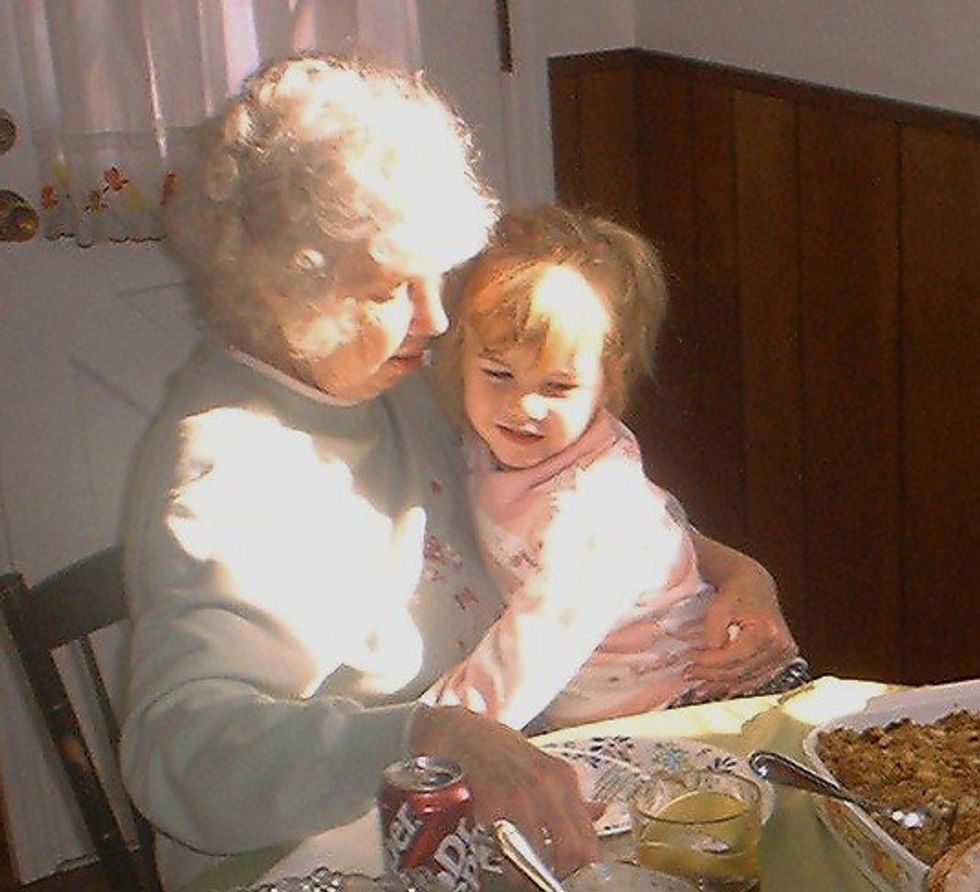The first time I wrote one of my own stories was when I was six years old. I still have the little notebook that it all began in, a shiny golden orange journal with a leafy plant emblazoned on the front. Inside are the barely readable scribbles of a little girl who had only recently learned to read for herself who was (in spite of this) trying to imitate the stories and books she was just starting to experience. In my confusing, uphill scrawl I penned badly spelled tales of giants, mermaids, and large forests, usually accompanied by roughly scribbled illustrations. I experimented with "flowery" language, like the kind my brothers read to me from Shakespeare and "The Chronicles of Narnia," and tried my hardest to access the deepest emotions I was capable of imagining. To give you an idea of my brilliance, I'll include a short story I wrote around this time. It remains, tragically, unfinished, but the caliber of my creative beginnings is still clear.
It reads: "A pumpkin sat in the sun. He had feelings, but he had no face. He was like Helen Keller. The farmer was on vacation. He was alone."
From reading this you can immediately deduce two things: 1.) I was obviously destined for greatness and 2.) I really didn't understand who Helen Keller was.
As a child, the idea of being a writer was the first fantasy of a career I latched on to. I told my parents, "I'm going to write books!" and joyfully showed off poetry and short stories I cranked out while staring soulfully at a painting of a girl sitting by a fireplace and holding a cat, which I considered the height of artistic interpretation. When I was a little older, say around seven, my brother came downstairs to find me typing doggedly at the computer, despite the fact that I only knew how to use two fingers to accomplish that task. When he asked what I was doing, I said I was writing letters. It was eventually revealed that I was writing what I called "notices," fake bad news in "formal" letter style about friends of my siblings and other people I actually knew. When asked why I was writing a letter to my brother's best friend I informed him that his house had tragically burned down, I said, "They're easy to write and they look nice. I'm not going to send them." When it was suggested I should write good news into these faux missiles instead, I responded, "That's not as fun." This marked the first time my family was horrified by my writing, but definitely not the last. (Just in case you're now convinced I was some kind of bitter little secretary as a child, here is a picture of me as a kid looking deceptively angelic with my Grandma. Saved it.)
Just like any other kid, I went through different phases, claiming alternately that I wanted to be an actress, a zookeeper, a belly dancer, a jockey, a Broadway star, a detective, and a "showgirl," but writing was the only skill set that actually began to develop and grow along with me. Even while I took acting and ballet classes, sang in school musicals, swam in my local pool, and organized clubs with friends, I kept writing stories. Many of my friends envied me for having something I was sure of, and despite the fact that I had my own dramatic little story of self-discovery and changing my major to English in college, I always knew ultimately that what I wanted to do was write, and that never changed for me.
Which brings us to now. Right now, as I write these words, I am sitting at the Welcome Center in the Student Union of Wright State, working for the undergraduate admissions office and trying to successfully be the "first welcoming face of the university." I am typing this into an email so I can send it to myself for editing later this evening when I am back at home. On my home computer there are several documents labeled "Script," "Novel," and "Story" all waiting to be worked on again when I have the time. I have to think about my homework which is due tonight and this weekend and keep an eye on my responsibilities for Student Government, as my new position there starts in the fall.I read articles in the New Yorker and books on writing by Stephen King and Anne Lamott before swapping these out for textbooks, tour guide materials, and 200 pages of reports on various Wright State assets. Welcome to my life, or should I say my double life, as I try to prepare for two careers simultaneously and make sure I have skill sets that fall into two very different groups. My position isn't unique. When I speak to others in the Creative Writing major, we speak in "maybe's" and possibilities instead of hard facts, and when we ask each other what our future plans, we add, "What do you really want to do?" and expect a complicated answer.
I feel very lucky to be able to go to school to learn how to hone my craft and become a more successful writer, but I balance this feeling of gratitude with concern that I won't be able to make it on craft alone when I get out of school. As much as I'd like to think it was a possibility, "just writing" after graduation isn't really an option, not if I want to move out of my parent's house or, you know, have enough money for food. I'd love to be the next young genius who writes a great American novel (do those exist anywhere else but in my dreams/nightmares?) but I'm not delusional. I won't bet on my twenty-year-old talent to pay rent just yet.
So this is where I find myself, in the midst of a balancing act, wanting to develop my creative skills as well as my more "employable" ones and discovering I am caught somewhere in between. I want to note here that it's not at all impossible to get a good job out of college in some literary pursuit, such as publishing or by becoming a literary agent or content contributor etc., but the fact of the matter is most of those jobs exist in places that I don't have the resources to move to just yet, and for every job that is out there, there exists a bevy of young hopefuls with similar or superior skills to mine competing for the same position.
This makes me sound hopeless, but I'm not. I'm full of hope, full of excitement and resourcefulness and willing to do just about anything, even maintaining this strange juggling act, to get where I want to go. Even beyond these things, I find myself, well, amazed. Amazed that instead of being shoved into a box, I can expand so many of my passions outward and become a more well-rounded individual for it. Is it exhausting? Sometimes. Do I have to wear a lot of different hats? Definitely. Am I always perfectly successful at everything I attempt? Ha. No. But am I bitter or angry about the fact that I probably can't just run into the sunset with my BA in English and hole up in some cabin and write for ages? Well, no, not really.
The fact is, this is my life. My beautiful, busy, full-to-the-bursting life. And I love it. I love the productivity and the challenge and although I am sometimes too hard on myself for letting my "passion projects" slide when I need to concentrate more fully on my concrete commitments, I still recognize that all of this is preparing me for the rest of my life, when age and more evolved relationships and careers will make things even more complicated. Having my time divided up this way between the things I love just reminds me of how much I love them, how dedicated I am to pursuing whatever it is I feel passionately about. They say absence makes the heart grow fonder, but so does hard work, tough decisions, and determination.
Balancing a creative life with more immediate practical needs such as financial security can be difficult, but it is not impossible for them to live in relative harmony. As a creator of any kind there's no need to see your day job or your other passions as being of lesser importance. Instead, try to see them as life-training and experience that can only benefit your creative pursuits by giving you a more time and experience tempered reference point in the real world and diverse perspectives you can choose to either expand or transform in your creative work. After all, it is that beautiful act of translating real life experiences through the lens of my unique human perception that gives me the energy to create in the first place, that reminds me of the importance of my work, of the reason I tell stories. From my very first attempts to write those silly stories in that golden notebook to the work I try to create and perfect now, I am constantly seeking balance. Balance is necessary in everything, any good creation, and what better way to learn balance then to implement it into your daily life.
























